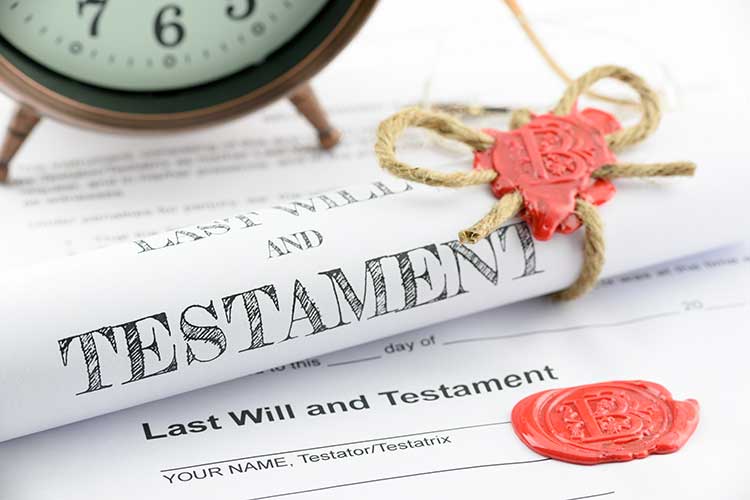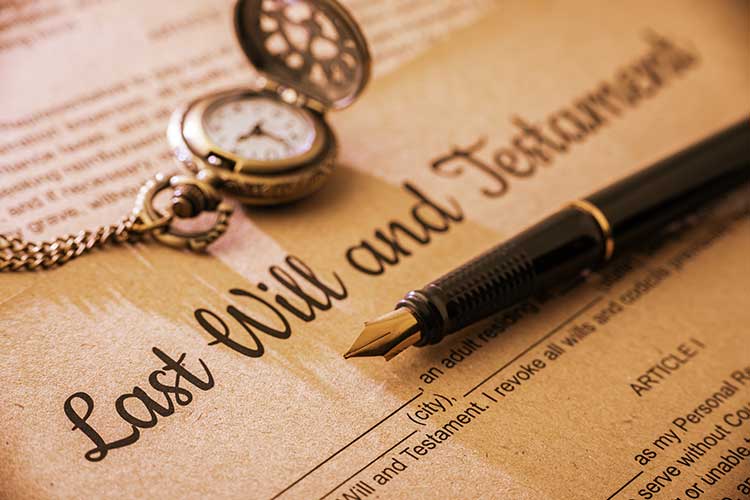Last Will
Estate Planning Experts & Personal Injury Attorneys
The Last Will and Testament, or Will, is an estate planning document that enables a person to declare how property will be managed and distributed after death. The person writing the will is known as the “Testator.” The person named to manage the will after the death of the testator is known as the “Personal Representative.”
Upon the death of the testator, a will provides a roadmap for the distribution and management of assets that are not transferred by other legal means. Certain assets may bypass the will because they are set up for automatic and direct transfer to a named party such as a beneficiary on a life insurance policy, joint owner of a bank account, the joint tenant on a deed/real estate, or a recipient of trust property. For assets that do not pass directly to a beneficiary, a will is necessary to determine the intentions of the testator.

Major Benefits of a Will
A will is a special document because it speaks when you no longer can. Here are just a few of the major benefits of a will:
- A will allows for a person to declare his or her intentions regarding the distribution of assets after death. Without a will, state laws, known as laws of intestate succession, will determine how your property is divided.
- You can amend your will at any time before death if there are any changes in circumstances.
- You can name a personal representative to protect your estate and manage your affairs after your death.
- You can name legal guardians to care for your children should you and your spouse die while your children are still minors.
Does an estate need to be probated if there is a will?
Property that passes through a will needs to be probated. Probate administration will require the services of an attorney. Probate proceedings are instituted in the probate court in the county where the decedent resided at the time of death. The probate court exists to ensure that the property of a person’s estate is properly distributed according to the will, or according to the laws of intestacy if the person dies without a will. Probate proceedings can be protracted and costly if the estate is contested or for a multitude of other reasons. On the other hand, most probate proceedings are handled efficiently and smoothly if the beneficiaries cooperate, and the affairs and finances of the deceased are orderly and organized.
What happens if you die without a Last Will and Testament?
Your property does not go to the government if you die without a will. If you die without a Last Will and Testament, the laws of intestate succession will kick in and dictate who will receive your probate estate. Fortunately, the laws of intestate succession govern the distribution of assets giving priority to blood relatives that survive the deceased party.
The laws of intestate succession do not always carry out the intentions of the deceased party but are an attempt to fairly distribute an estate to surviving family members in the absence of a Last Will and Testament.

Can you disinherit a spouse in Michigan? Children?
In Michigan, a spouse may not be disinherited and is entitled to choose that which is given in the will or according to the widow’s rights statute (MCL 700.2202). However, there is no obligation to leave anything to adult children provided there is no further legal support obligation. In disinheriting an adult child, we recommend that the language is carefully selected. Also, it is not necessary to say that you are “leaving one dollar to my child” when you are disinheriting someone. Although this language is still used, it is not required and can lead to more sadness and pain for the person being disinherited.

Avoiding probate
An estate does not have to be probated if certain measures are taken during a person’s lifetime. A living trust is a common way to avoid probate and allow for the smooth transition of management and assets to loved ones. Avoiding probate can also be accomplished by transferring property while a person is alive or automatically upon death by the following means:
- Naming beneficiaries (payable on death) on life insurance, bank accounts, brokerage accounts, and retirement accounts.
- Owning bank accounts jointly with others.
- Using deeds to create joint ownership of the real estate.
Find out if joint ownership of property is right for you or if you will end up unintentionally leaving out loved ones.
You should talk to a Macomb Estate Planning attorney before you make any drastic changes to your accounts, deeds, or titles. Owning property jointly or adding someone onto a title is not always a prudent estate planning move. Once you transfer title to property or add a name to an account, there is the possibility of triggering a taxable event and creating potential liability to the party that is added to the title. You also must ask yourself if the joint owner will act in the best interest of the estate and whether the jointly held property will lead to unintentional disinheritance of other intended beneficiaries.
Let us help you Plan, Prosper & Live Well
Macomb Estate Planning is here to help you plan, prosper, and live well. We will work with you to build the best estate plan that fits your unique estate and family circumstances.



